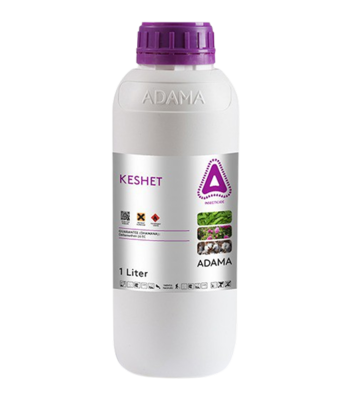Keshet 25 EC
An insecticide for the control of a wide range of pests in roses, snow peas and cotton

General Info
Keshet 25 EC is a synthetic pyrethroid which is made to mimic the pyrethrins that are isolated from chrysanthemum flowers, they are among the most popular and widely used insecticides in the world.
WHO CLASS II.
Application Advice
Resistance Management
To prevent risk of developing pest resistance it is recommended that Keshet 25 EC be alternated with products of different modes of action.
Safety
Keshet 25 EC is non-toxic to bees, highly toxic to fish. Do not contaminate streams, rivers or waterways with the chemical or used packs.
Hazards/precautions
Handling: Wear protective clothing such as overalls, footwear, gloves, and face shield when preparing and using the product. Do not eat, drink or smoke while using it. Avoid inhaling spray mist, contact with skin, eyes and clothing. Do not apply upwind and stay out of the spray mist.
After work: Wash hands before breaks and at end of work. Change clothes and wash hands and face with soap and water thoroughly. Wash the spraying equipment and any contaminated clothing carefully.
Storage: Keep out of reach of children. Store in tightly closed original container in a cool dry and well ventilated place, under lock and key so that unauthorized persons do not have access. Keep away from food, drinks and animal feeds.
Disposal: Tripple rinse the bottle and puncture or perforate it and dispose off in a landfill site approved for pesticides or dispose away from water resources in accordance with National Regulations or return to stockist/Distributor. The rinsate should be disposed off away from surface water to avoid contamination. Do not re-use the empty container for any other purpose.
Leakage and spillage: Wear protective clothing. Use sand or sawdust to absorb the chemical and collect it using a shovel. Put in authorized disposing containers. Do not contaminate waterways and rivers. In case of large spills, consult the distributor.
FIRST AID INSTRUCTIONS
If poisoning is suspected, contact the doctor or Poisons Information Centre.
Skin contact: Take off clothing; wash the skin immediately with plenty of water and soap
Eye contact: Hold the eye open and rinse thoroughly with running water for 15 minutes.
If inhaled: Move the patient to fresh air. If the subject is not breathing, give artificial respiration, preferably mouth-to -mouth and call the doctor immediately.
If swallowed: Do not induce vomiting. Wash out mouth with plenty of water. Never give anything by mouth to an unconscious person. Seek medical advice immediately.
Always read the label carefully before use.